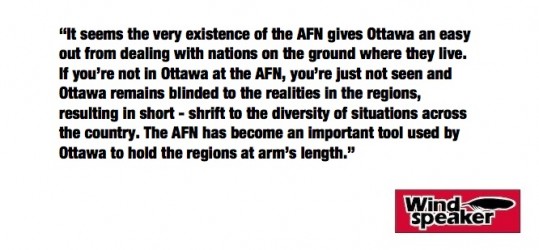Article Origin
Volume
Issue
Year
On April 26, 2013, the Union of BC Indian Chiefs wrote to federal Aboriginal Affairs Minister Bernard Valcourt thanking him for attending a meeting of BC’s First Nations Leadership Council early that month in Coast Salish territory in Vancouver. It was a kind of back-handed thank you, however. The second line in the letter read “it appeared that you were not aware of the Union of BC Indian Chiefs’ long history, mandate and large active membership.”
Astounding as that might seem to many who know UBCIC as a very active First Nations organization led by a most prolific communicator and critic of the federal government, Grand Chief Stewart Phillip, UBCIC still was willing to grant Valcourt the courtesy of looking past his lack of knowledge about the organization, given he had just been recently appointed. Perhaps they shouldn’t have.
A year and a bit later, with all eyes now on the Assembly of First Nations, the national First Nations organization that seems to be swirling the drain after the resignation of its elected leader, Shawn Atleo, it might now be time to really evaluate if a national organization just gets in the way of the needs in the regions. It had been a long time that anyone from so high up in the federal government had met with the BC’s First Nations Leadership Council in B.C., and this meeting was prompted by the needs of Ottawa to get those nations onside with the pipeline progress across the province, not the very real needs of B.C. nations.
It seems the very existence of the AFN gives Ottawa an easy out from dealing with nations on the ground where they live. If you’re not in Ottawa at the AFN, you’re just not seen and Ottawa remains blinded to the realities in the regions, resulting in short-shrift to the diversity of situations across the country. The AFN has become an important tool used by Ottawa to hold the regions at arm’s length. What can be achieved by that?
While the AFN is trying to figure out how it is not only to remain relevant, but survive, how it will react to the grassroots people demanding a real voice in the organization, it’s perhaps time that the regional organizations spend some effort to determine if such representation in the AFN works to their best interests. If all that results is infighting—that old treaty, non-treaty divide is only part of the problem—and that’s all the AFN can really boast about in these last five years, then it may be time to turf membership in the organization altogether.
Atleo has gone away, but the very real problems of the AFN remain. The AFN will change leaders, but that’s not going to bring the nations any closer to getting what they need from Ottawa. Perhaps it’s time to just push the organization over the side of the ship, and start to make Ottawa come sit with the people, not the other way around.
Windspeaker
- 4567 views

